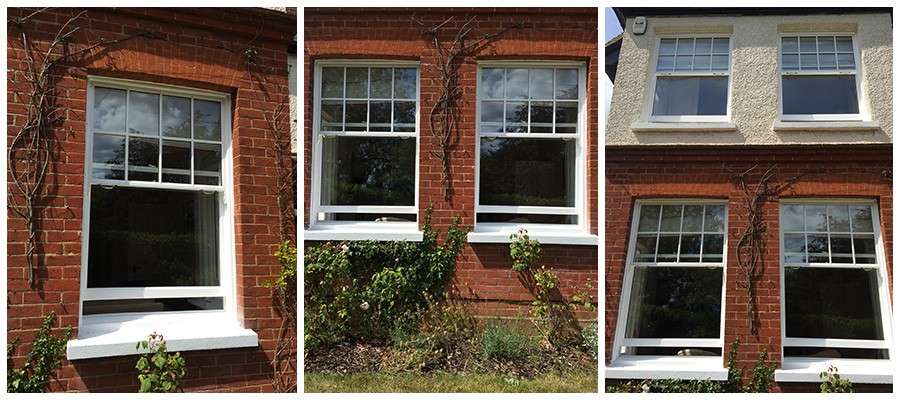
If you’re looking for replacement sash windows in the UK, you may have noticed something: double-glazed sash window units are standard, with single-glazed options being exceptionally rare. And this isn’t by chance – there are compelling practical, legal, and economic reasons why double glazing has become the norm for sash window replacement across the country.
The Single-Glazed Exception: Heritage Properties
The most common scenario where single glazing is still specified relates to properties with special heritage status. This typically involves two situations:
- Listed Buildings face the most restrictive requirements. When a property is designated as a listed building due to its special architectural or historic interest, any alterations that could affect its character require Listed Building Consent from local authorities. Heritage bodies frequently deny consent for double glazing because the thicker glazing bars and increased depth of modern double-glazed units can significantly alter the delicate appearance of original traditional sash windows, it is increasingly likely that slimmer double glazing and Vacuum glass is now being considered on a property-by-property basis.
- Conservation Areas present similar challenges. Even non-listed properties within these specially designated areas must preserve or enhance the area’s character and appearance. Many councils have Article 4 Directions in place, removing permitted development rights and requiring planning permission for window replacements that would normally be considered minor changes.
The central issue is the conflict between modern energy efficiency standards and the need to maintain historical authenticity. Traditional wooden sash windows feature very slim glazing bars that are difficult to replicate with double-glazed units due to their thickness, potentially changing the window’s proportions and the building’s overall appearance, it is possible to have either a bonded slim glazing bar or even a slim glazing bar with individual double-glazed units which councils also appreciate and usually accept. That said, uPVC sash windows are also not an option.
Why Double Glazing Became the Standard
For the vast majority of UK properties, i.e. those without heritage restrictions, double-glazed sash windows offer compelling advantages that have made them the default choice:
- Energy Efficiency Requirements: Modern building regulations strongly favour energy efficiency, and double glazing significantly outperforms single glazing in thermal performance. The average cost of double-glazed sash windows in the UK reflects both the demand and the investment homeowners are willing to make in energy efficiency.
- Market Expectations: Today’s homeowners expect modern performance standards from their windows. Double glazing provides better insulation, reduced condensation, and improved comfort levels throughout the year.
- Economic Sense: The energy savings from double glazing over the window’s lifespan typically justify the investment, especially given current energy prices and the UK’s push toward net-zero emissions.
- Noise Reduction: Double-glazed sash windows offer significant acoustic benefits, particularly valuable in urban areas or near busy roads.
So, whilst double glazing has been the norm in casement windows for decades now, double-glazed sash windows are also part of that expectation. And with our traditional wooden-framed double glazing, your home will not just feel warm but look fantastic too.
What About Triple Glazing for Sash Windows?
Triple glazing represents an even higher level of energy efficiency, but there are practical considerations when it comes to traditional wooden sash windows:
- Weight and Structural Concerns: Triple-glazed units are considerably heavier than double-glazed alternatives. Traditional wooden sash frames, particularly in period properties, weren’t designed to support this additional weight. The extra load can cause structural stress and operational problems with the sliding mechanism. This means that the period design and features of timber windows and doors must be significantly enlarged and is therefore a largely impractical solution rarely employed.
- Frame Thickness Requirements: Triple glazing requires deeper frame sections to accommodate the thicker glass units, which can be challenging to achieve while maintaining the proportions and aesthetic of traditional sash windows.
- UK Climate Considerations: While triple glazing offers superior thermal performance, the UK’s relatively moderate climate means the additional benefits over quality double glazing are often marginal. The investment rarely pays for itself through energy savings alone in most UK locations.
- Cost-Benefit Analysis: The significant extra cost of triple glazing for sash windows is difficult to justify for most UK homeowners when quality double glazing already provides excellent thermal performance.
While triple-glazing may sound like great because it’s often mentioned in property shows, it’s not a practical solution for sash replacements, so double-glazed sash windows are perfect for most replacements.
Solutions for Heritage Properties
Property owners in listed buildings or conservation areas aren’t without options. Several approaches can improve energy efficiency while maintaining historic character:
- Restoration and Upgrade: Repairing and overhauling original sash windows remains the preferred option for heritage properties. Modern draught-proofing techniques can significantly improve thermal performance without altering appearance.
- Secondary Glazing: This popular solution involves fitting a second pane of glass inside the existing window. It doesn’t change the external appearance at all, making it acceptable to conservation officers while improving thermal efficiency and noise insulation.
- Slimline Double Glazing: Specialist companies now offer vacuum-sealed or ultra-slim double glazing that can fit within traditional glazing bar dimensions. While more expensive, it’s increasingly accepted by planning authorities as it preserves historic character while delivering modern performance.
However, listed buildings and conservation areas are a small proportion of the overall number of properties with traditional sash windows. While we are happy to create bespoke traditional wooden sash windows for such properties, most homeowners will need and wish to have double-glazed sash windows.
The Market Reality
The dominance of double glazing in the replacement sash window market reflects the practical reality rather than just an arbitrary choice. As window manufacturers and installers, we focus our efforts on double-glazed sash window products because:
- They meet current building regulations and energy efficiency standards.
- They satisfy consumer expectations for comfort and performance.
- They offer the best balance of cost, performance, and practicality.
- They’re suitable for many UK properties.
- Heating bills can be reduced and noise ingress significantly denied.
As a specialist manufacturer, supplier, and fitter, we can still create bespoke single-glazed sash windows, but they’re primarily produced for the specific heritage market where planning restrictions require them.
Making the Right Choice
For most UK homeowners, double-glazed sash windows represent the optimal choice, delivering:
- Excellent thermal efficiency suitable for the UK climate.
- Significant noise reduction benefits.
- Condensation control and improved comfort.
- Long-term energy savings.
- Compliance with modern building standards.
- Wide availability from multiple suppliers.
If you’re considering sash window replacement, the prevalence of double-glazed options isn’t a limitation, it’s a reflection of what works best for the majority of UK homes. The technology has evolved to provide double-glazed sash windows that maintain traditional aesthetics while delivering modern performance standards.
Only properties with specific heritage restrictions need to consider single glazing, and even then, alternative solutions like secondary glazing often provide a better overall outcome.
The market has spoken clearly: double glazing represents the sweet spot of performance, practicality, and value for UK sash window replacements, which is why it has become virtually universal outside the specialist heritage sector.
Next Steps
When choosing sash window replacements, always check your property’s planning status with your local authority and consider consulting with The Specialist in Sash Windows – we understand both modern glazing options and heritage requirements. The right solution balances your property’s specific needs with current performance standards and regulatory requirements.
Call our friendly, knowledgeable team on 0800 389 7384 for expert advice.






